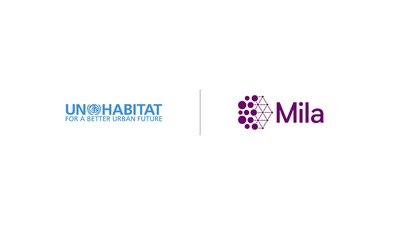TORONTO, le 4 oct. 2022 /PRNewswire/ — ONU-Habitat, le programme des Nations Unies chargé de promouvoir l’urbanisation durable dans plus de 90 pays, et Mila, le plus important centre de recherche universitaire en apprentissage profond au monde, annoncent le lancement de leur livre blanc collaboratif. Ce document présente des observations et des recommandations sur la façon dont les systèmes d’intelligence artificielle (IA) pourraient être exploités pour soutenir le développement de villes et d’établissements humains durables sur les plans social et écologique.

Conçu pour soutenir à la fois les gestionnaires et les praticiens en urbanisme, le livre blanc, qui s’inscrit dans la stratégie d’ONU-Habitat visant à promouvoir une démarche de transformation numérique axée sur les personnes, présente la valeur ajoutée et les défis actuels de l’IA dans les villes. Il fournit aussi un ensemble de recommandations pratiques pour améliorer la façon dont l’IA est utilisée afin de favoriser des villes durables et des collectivités inclusives.
Le document couvre les applications urbaines de l’IA dans un large éventail de secteurs (énergie, mobilité, sécurité publique, soins de santé, etc.) et aborde des thèmes importants, notamment les inconvénients et les risques de l’IA, des approches spécifiques et l’utilisation de l’IA urbaine en gouvernance urbaine.
Le livre blanc sera dévoilé à l’occasion d’un panel qui se tiendra au Urban Economy Forum 2022 à Toronto.
« L’intelligence artificielle, comme toute autre technologie, peut être une force qui accentue ou réduit les écarts sociaux; tout dépend de comment elle est utilisée. Nous avons la responsabilité collective d’utiliser et d’intégrer adéquatement les solutions d’IA en veillant à ce qu’il n’y ait pas de conséquences imprévues », déclare Maimunah Mohd Sharif, Directrice exécutive du Programme des Nations Unies pour les établissements humains d’ONU-Habitat.
L’objectif du livre blanc est de fournir aux autorités locales des conseils utiles pour évaluer les avantages et les inconvénients de l’IA afin de favoriser des collectivités locales durables. Les autorités locales prennent régulièrement des décisions au sujet de l’IA qui ont une incidence sur la vie des gens. Elles ont donc besoin d’outils pour évaluer où et à qui l’IA apporte une valeur ajoutée, et déterminer si son utilisation est appropriée dans un contexte donné. Le document sert de base de connaissances pour guider la prise de décisions en ce qui concerne l’engagement positif et l’utilisation de l’IA dans une optique de villes et d’établissements humains durables, intelligents et centrés sur les personnes.
« Comme toute autre occasion de transformation, l’intégration de l’IA dans les environnements urbains comporte des défis et des risques qui doivent être pris en compte et traités avec sérieux pour que l’IA puisse améliorer les sociétés », déclare Valérie Pisano, présidente et chef de la direction de Mila. « Ce livre blanc pourrait être un outil très utile pour les autorités locales qui, comme ONU-Habitat et Mila, se consacrent au développement responsable de l’IA. »
Visitez le site https://unhabitat.org/ pour accéder au livre blanc complet.
Principaux auteurs du livre blanc :
- Jean-Louis Denis, professeur titulaire (UdeM)
- Golnoosh Farnadi, professeure adjointe (HEC Montréal), membre académique principale (Mila), titulaire d’une chaire en intelligence artificielle Canada-CIFAR
- Shaz Jameson, doctorante (Tilburg Institute of Law and Technology, UdeM, Mila)
- Shin Koseki, professeur adjoint (UdeM), directeur (chaire UNESCO en paysage urbain)
- Catherine Régis, professeure titulaire (UdeM), membre académique associée (Mila)
- David Rolnick, professeur adjoint (Université McGill), membre académique principal (Mila), titulaire d’une chaire en intelligence artificielle Canada-CIFAR
Renseignements sur le lancement :
- Événement : panel sur le lancement du rapport intitulé « AI and Cities: Risks Applications and Governance » d’ONU-Habitat et de Mila à la quatrième édition du Urban Economy Forum (UEF4 ) on Sustainable Urban Finance. La séance d’ouverture qui aura lieu le lundi 3 octobre à 9 h (HAE) donnera le coup d’envoi de la quatrième édition du Urban Economy Forum (UEF4 ) on Sustainable Urban Finance.
- Lieu : Toronto, Canada, au World Urban Pavilion (WUP) dans le quartier Regent Park et en ligne. Lien pour l’inscription gratuite : https://www.eventbrite.ca/e/
uef4-tickets-344374632797? discount=COMPLIMENTARY100 - Heure du lancement : Le mardi 4 octobre 2022 à 16 h 45 (HAE)
- Conférenciers :
- Anna Jahn (modératrice), directrice, Politiques publiques et éducation, IA pour l’humanité (Mila)
- Golnoosh Farnadi, professeure adjointe (HEC Montréal), membre académique principale (Mila), titulaire d’une chaire en intelligence artificielle Canada-CIFAR
- Shaz Jameson, doctorante (Tilburg Institute of Law and Technology, UdeM, Mila)
- Davild Rolnick, professeur adjoint (Université McGill), membre académique principal (Mila), titulaire d’une chaire en intelligence artificielle Canada-CIFAR
- Renseignements sur le forum : https://www.ueforum.org/uef4
ONU-Habitat est le programme des Nations Unies œuvrant à un meilleur avenir urbain. Sa mission est de promouvoir le développement durable des établissements humains sur le plan social et environnemental ainsi que l’accès à un logement décent pour tous. Le programme œuvre dans plus de 90 pays afin de favoriser des changements transformateurs dans les villes et les établissements humains par le biais de connaissances, de conseils politiques, d’assistance technique et de mesures collaboratives. Il travaille avec des partenaires pour bâtir des collectivités et des villes inclusives, sécuritaires, résilientes et durables tout en faisant la promotion de l’urbanisation comme une force transformatrice positive pour les personnes et les collectivités en vue de diminuer les inégalités, la discrimination et la pauvreté. Renseignements supplémentaires sur le programme : ONU-Habitat – Pour un meilleur avenir urbain | ONU-Habitat (unhabitat.org)
Fondé en 1993 par le professeur Yoshua Bengio de l’Université de Montréal, Mila est un institut de recherche en intelligence artificielle qui rassemble aujourd’hui plus de 1000 chercheurs spécialisés en apprentissage automatique. Basé à Montréal, Mila a pour mission d’être un pôle mondial d’avancées scientifiques qui inspire l’innovation et l’essor de l’IA au bénéfice de tous. Mila est une organisation à but non lucratif reconnue mondialement pour ses importantes contributions au domaine de l’apprentissage profond, en particulier dans les domaines de la modélisation du langage, de la traduction automatique, de la reconnaissance d’objets et des modèles générateurs.
Ekaterina Bezgachina (ONU-Habitat), ekaterina.bezgachina@un.org; Eric Aach (Cabinet de relations publiques NATIONAL pour Mila), eaach@national.ca
